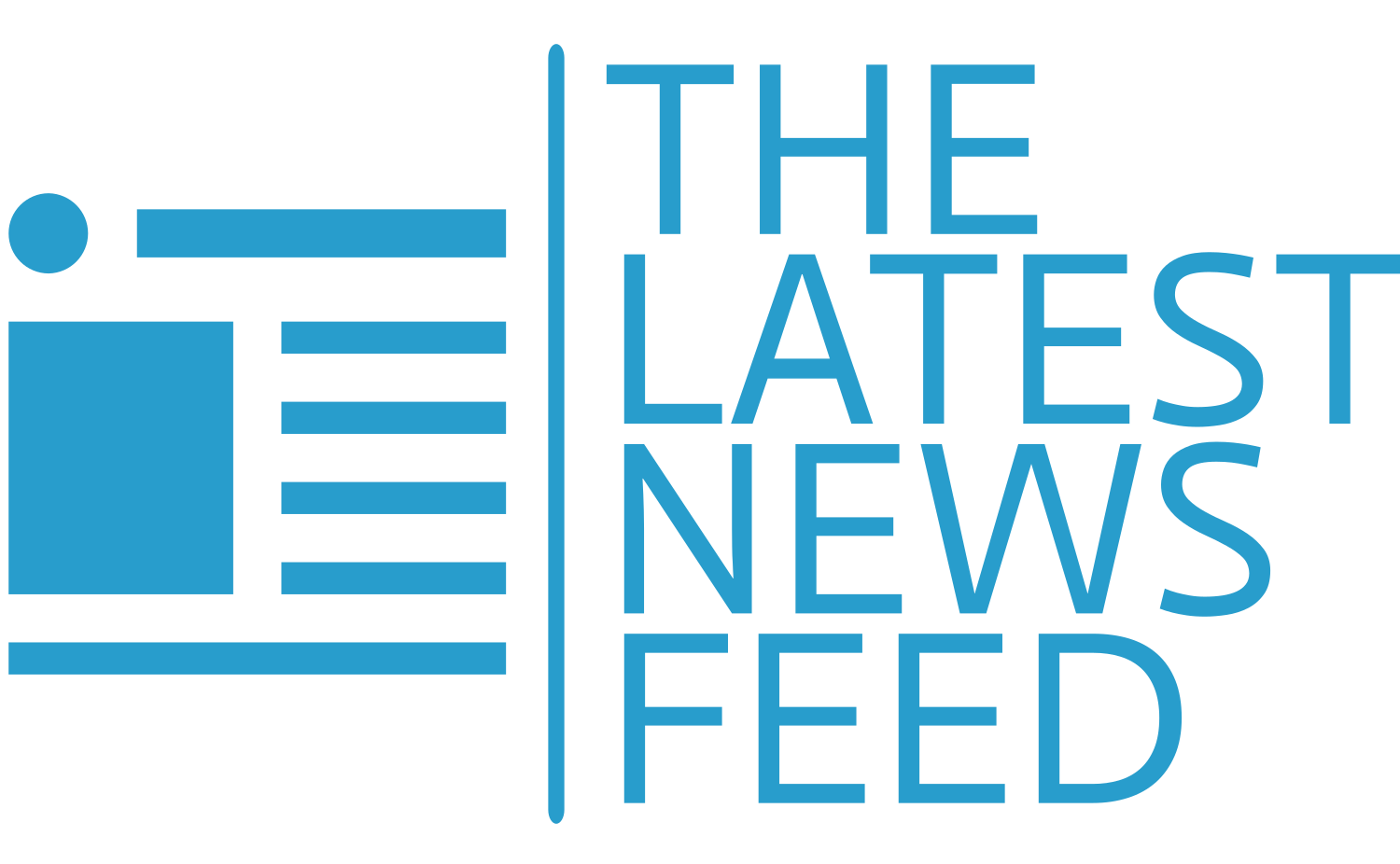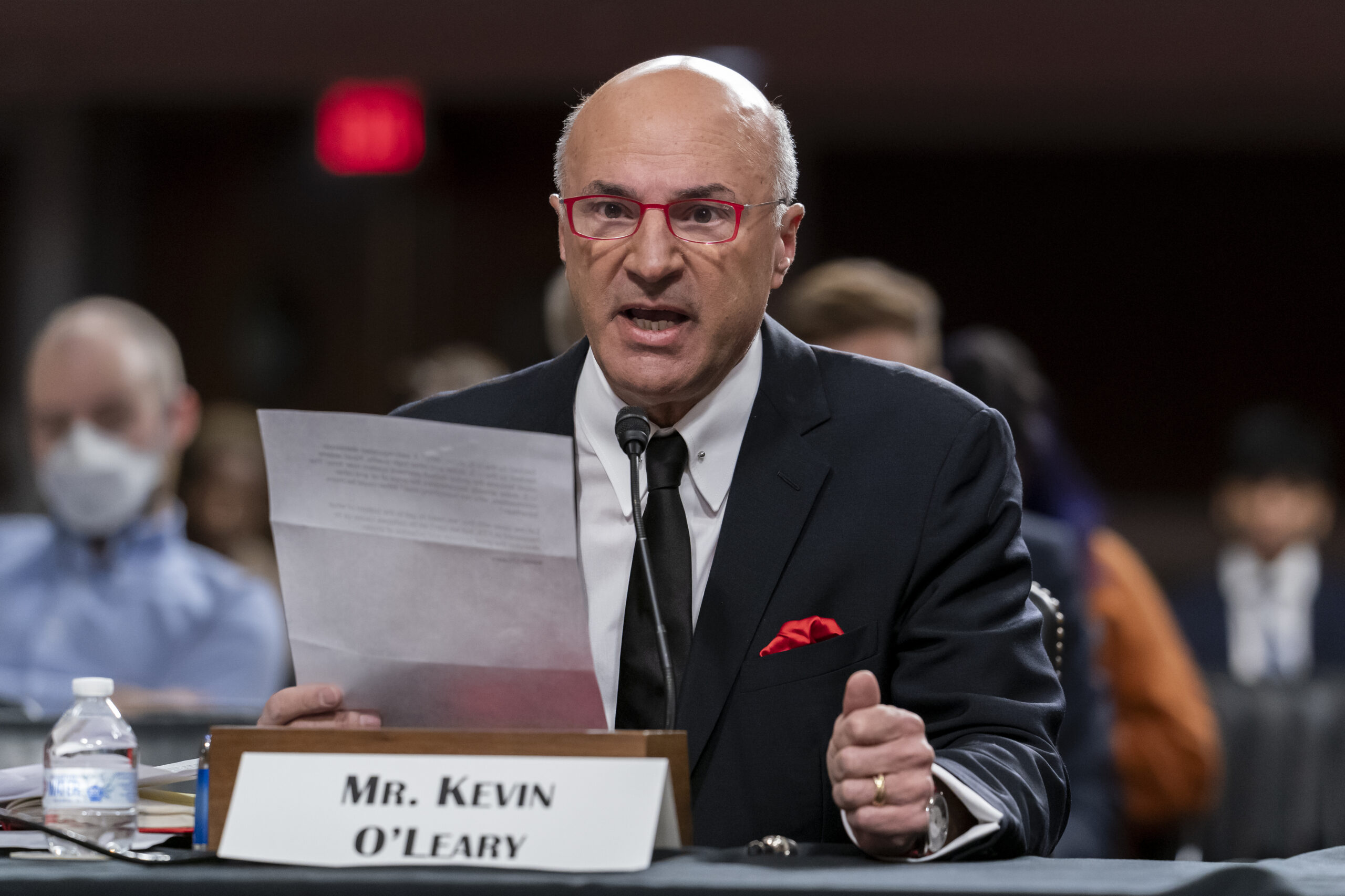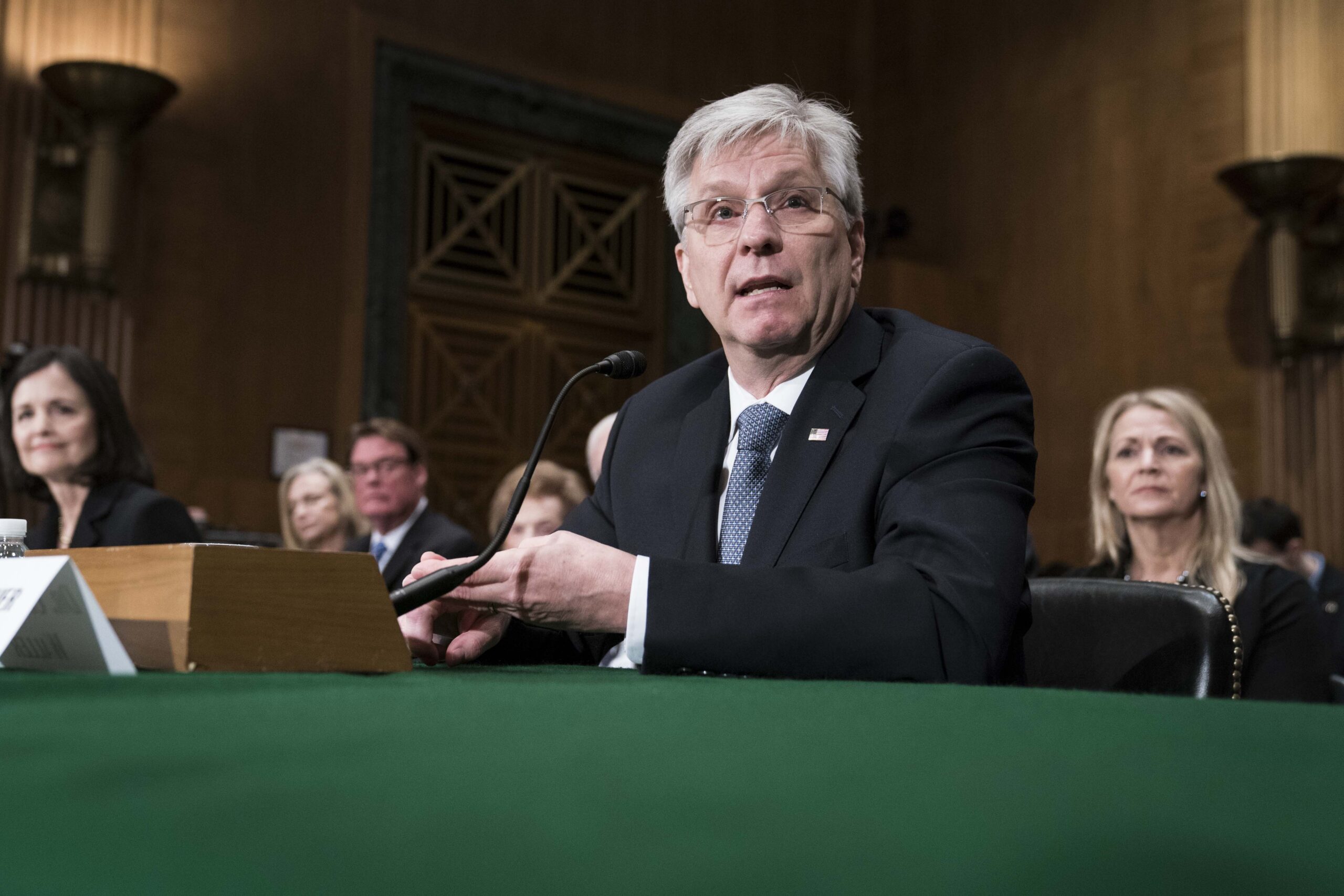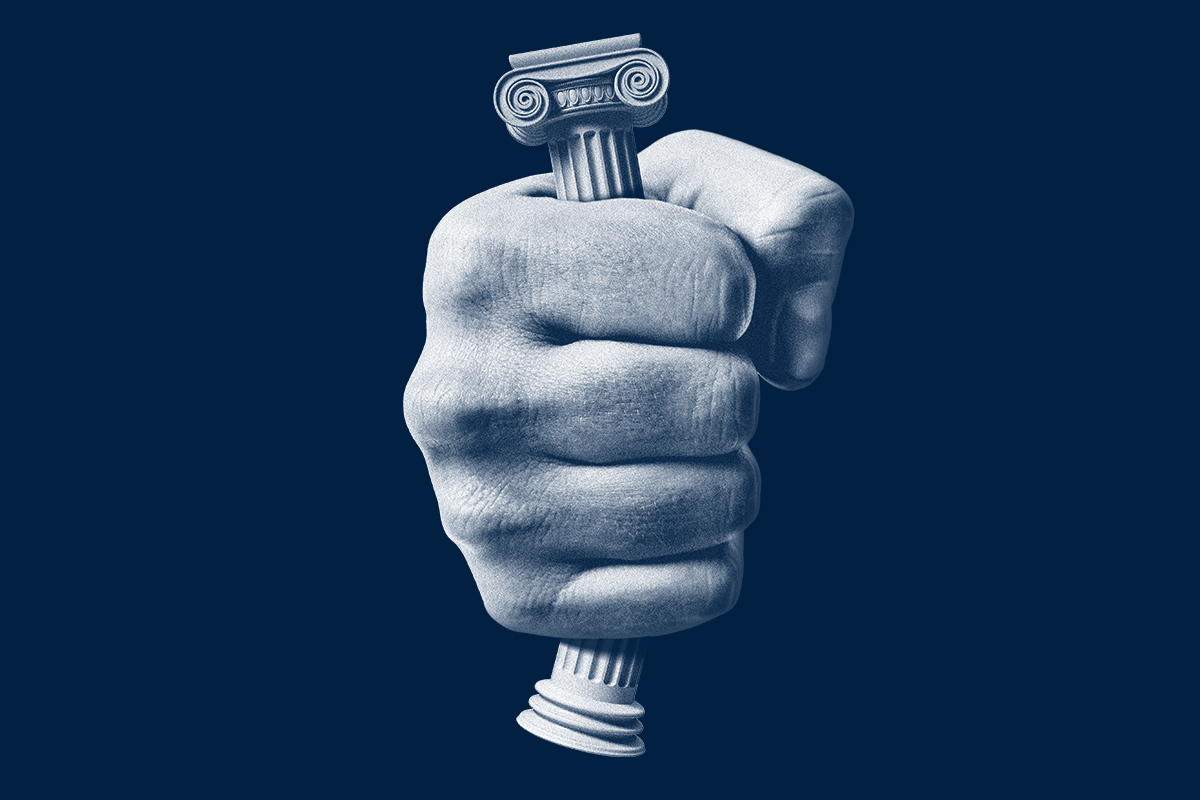Kevin O’Leary, known to many as Mr. Wonderful on the “Shark Tank” business reality show, has little time for politics. He cares about the money.
“I look at policy. You can’t make money with a politician. You make money on the policy they create through their administration,” O’Leary said in an interview on the Conversation podcast.
And he gives the Trump administration high marks, citing the large foreign investments flowing into the United States and a still-rising stock market.
At the same time, O’Leary is not a huge fan of President Donald Trump’s tariffs (“a headache”) or his incursion into the Federal Reserve’s independence (“Don’t mess with that.”).
But in a wide-ranging conversation that also touched on the future of TikTok, H-1B visas and AI, the longtime investor may have grown most animated in decrying Trump’s move to have the U.S. government take a stake in Intel.
“Intel is a bad investment. It’s been where money goes to die for the last 10 years. Why kill more money?” he asked. “They’re a terrible company. Somebody has to tell the truth. I’m just telling you how it is. That dog don’t hunt. It should have been taken behind the barn and shot a long time ago.”
This conversation has been edited for length and clarity by The Conversation Producer Kara Tabor. You can watch and listen to the full podcast interview here:
Before the Trump administration came into the White House, you had some pretty high hopes for what this president would do for business, big and small, and for the economy at large. How would you grade President Trump’s performance on the economy so far?
The way I grade it is the way the world grades it: I look at capital flows and I don’t shill for politicians. I’ve said that countless times.
I look at policy. You can’t make money with a politician. You make money on the policy they create through their administration. And so when you look at fund flows from sovereign wealth, which is a massive amount, the majority of money invested today comes from those funds all around the world — whether it’s the Middle East or the Nordic countries or whatever — more than half of every dollar is invested from them in the United States S&P 500 or the U.S. economy.
That’s one metric to look at. So that’s confidence in the economy, in aggregate of all the policies, including all the tariff wars and all the rest of it. And then you look at the U.S. domestic market itself, hitting all-time new highs when many people say, “How’s that possible? Why is it hitting new highs? What’s the reasoning behind that?” And I think we can dissect all these things, but those two measures themselves give this administration high marks on policy.
Now you may not like the way Trump makes sausage. A lot of people don’t like it. They have Trump Derangement Syndrome. I don’t care about any of that. This is a president who doesn’t give a damn if there’s a camera in the room when he’s ripping something to pieces in the Oval Office. It’s not the normal way things get done. And it doesn’t matter because what comes out of that is the policy.
But we’re not there just yet. And in the meantime, the sausage making, it hasn’t been pretty, right? I think you’ve probably heard a lot of big business owners and small business owners, the uncertainty is really rattling some folks. The market has sort of factored that in. But for the people that need to figure out a supply chain day-to-day, they need some kind of outlook that is stable and makes some sense, right?
The people that come on Shark Tank, they’re entrepreneurs, they’re starting small businesses or trying to grow their businesses. Is this climate conducive to that??
Everybody wants everything resolved all the time. I would note after 17 years of Shark Tank, entrepreneurial endeavors across America, where the majority of jobs are created between companies with five to 500 employees, they have withstood everything, including tariff wars. They’ve gone through periods of seven to 19 percent interest rates, a meltdown in real estate.
In fact, the best time to start a business, proven by the statistics, is in chaos. Every time the American economy is going through some kind of a correction is a fantastic time to be an entrepreneur and start something. And then you have to figure out how to pivot through it.
I also think a lot of companies have found solace in something else that’s had productivity — one of the reasons the market’s at all-time highs: AI. I thought it was hype two years ago. Every single one of my companies uses it today and it’s very productive. It helps enhance margins. It reduces costs in every sector of the economy.
And so yes, tariffs are a headache. Yes, they increase input costs, but even in home building, people are figuring out ways to do better capital expenditures around softwood lumber or labor or whatever it is using AI tools to do it.
A large business like automotive, they’re suffering too with input costs, but slowly but surely these deals are getting worked out.
Did this administration bite off maybe a bit more than they could chew with a really unprecedented level of tariff and trade war?
Well, you’re right. Nobody’s ever attempted to do 60-plus deals in 90 days. But my attitude is it is what it is, deal with it. Don’t get deranged getting caught up in the political nature of what this is because there’s certainly politics involved. Focus on the policy so you can make radical investment decisions at minimal risk.
If you look for the path of least resistance, you want to find big opportunities because of disruption. You want to find something that has completely been dislocated and invest in that because of the policy changes.
You’ve also been critical of the administration in using taxpayer dollars to buy a stake in Intel. Is that something that the government should be getting involved with?
No, it’s a waste of taxpayer dollars. I don’t agree with everything Trump does. I don’t agree on the policy coming out of the administration on every policy. I look at each policy and say, “Does it make sense or not from the perspective of an investor?”
Intel is a bad investment. It’s been where money goes to die for the last 10 years. Why kill more money? It’s one of the worst managed companies in the world when it comes to semiconductors. Nobody wants to buy their products. It should be sold for parts. That’s how capitalism works.
I don’t want Intel to get my money. I don’t give them my money as a private citizen. They’re a terrible company. Somebody has to tell the truth. I’m just telling you how it is. That dog don’t hunt. It should have been taken behind the barn and shot a long time ago.
So what’s your advice to the Trump administration on that?
Don’t do it. I would have killed the CHIPS and Science Act. That was a stupid act. I read it. There wasn’t a dime in there for entrepreneurial, smart businesses. It was just a government handout. And a lot of it — almost more of it than anybody else — went to Intel, the biggest dog in the sector.
But look, Trump gets to do what he wants. He’s the president. I don’t have to agree with everything he does. I’m just telling you what I didn’t like about that act. I’m not the only person pointing this out.
You talked about how business owners might make their way through this trade war, and maybe come out the other end better off. What is your advice to the president right now in terms of what he could change about his approach to trade and tariffs that could make this process better for the American people?
I tell every president this, and I’ve had the fortune to meet many of them: their primary mandate is not to pick sectors in the economy. The American economy is the most successful economy on earth and has been for 200 years. We know what we’re doing. The less government we have, the better. The number one mandate of a U.S. president — whoever’s sitting in that honored seat — is to uphold the American dream. Our number one export is not energy. And it’s not technology. It’s the American dream.
We’re the only economy on earth where everybody, everywhere wants to come here and start a business — everywhere. They risk their lives to do it. Keep capitalism alive because it works and it provides for everybody, even though it’s volatile and it’s got lots of problems. Where else would you rather be?
If there’s bad policy, it eventually gets worked out. Anything that hurts the American dream or messes with capitalism is bad.
Do you think there’s anything that the administration is currently doing that is messing with the dream?
Well, it doesn’t matter what I think. It’s what the market thinks and what capital thinks. Here’s another topic: Fed independence. Don’t mess with that. It works. People bring their money here because they like the yin and yang between the executive and the Fed.
The president does not love that yin and yang.
Well, the markets do. They like it. And they make the assumption that when you get a seat on the board of the Fed, you have an obligation for their two mandates, full employment and 2 percent inflation. We are nowhere near 2 percent of inflation. So we shouldn’t be cutting rates right now. We should wait until we get a signal on where inflation is going. We don’t want to turn into Venezuela where hyperinflation devalues everything in the country. I have one voice on this. There are many, many others. I like Fed independence.
The Fed has always, always, always been abused by the administration, regardless of what administration it is. They simply don’t care because they’re the Fed. It’s a perfect power balance.
Is this administration playing a dangerous game with the Fed, you think?
They’re playing a game with the Fed. I don’t think you’re going to be able to stack the Fed like you can stack the Supreme Court. It’s not going to work that way.
[Federal Reserve Chair Jerome] Powell, what does he have? Four and a half months left? He’s thinking about his legacy. He’s not going to kowtow to anybody. He’s just going to do what he thinks is right for the country.
I don’t like that inflation number 2.8 staying steady. I don’t like it. So look, that’s an opinion. It doesn’t mean I’m right. It means I have one point of view.
You’re caveating your opinion a whole lot here, Kevin.
I get it, but I want to point something out. I simply work with information that I get, alright? It’s important that the Fed set interest rates and they do policy on employment and we should let them do that. And the reason the administration should be comfortable with that is they have been very successful.
You can’t say that Trump has not been successful when you look at foreign capital flows into this country, job creation in this country and the index of the S&P 500. I say to him, “Keep it up, but be careful. You can’t get everything you want.” But what he’s delivered so far by the metrics, by the measure, by capital flows — wildly successful.
The administration is trying to change some of the visa programs, including the H-1B visa program that a ton of companies use to bring smart people from all over the world here that then end up starting companies. What is your perspective on the changes they’re trying to make to the H-1B visa program?
I understand what the administration’s doing there. I understand what Howard Lutnick said about it. He doesn’t want it being abused by large tech companies that want to reduce labor costs by hiring people with H-1Bs. I get it, but that’s a broad stroke. And obviously Amazon and Apple have been singled out on that one. And maybe, to the extent they did that, they should stop.
I’m okay with that, but what I am worried about is taking that broad paint roller over another aspect of the program that’s very important: startups. They can’t afford $100,000 if they can’t find an AI engineer. We’ve hired everyone we possibly can in America. It’s a highly, highly specialized talent. If I could get another AI engineer out of Pakistan, India, or a country where they can get approved for their application, I would want to be able to hire them as a startup because it would give me a competitive advantage to compete globally with great talent. I don’t think we want to take that away from American companies. So I would adjust this H-1B mandate for only large corporations at some size where they can afford it.
My operating companies can afford this. I’m not against it. But I’m telling the administration now, “We can’t hire all the engineers we need. We do not graduate enough engineers in America.” The Chinese are kicking our ass on that too. Design engineers, AI engineers, coders, you name it. They’re popping them out of their institutions a lot faster than we are. I keep going back to China because we are in a competition with them and we need policies that recognize that.
Your friends in big business, your CEO pals, are they concerned about the uncertainty with trade? What is the vibe behind the scenes with the business people that you know?
The vibe behind the scenes on tariff and trade policy specifically is they’re going to end up reciprocal. It’s going to be brutal watching this passion play out, but country-by-country, it’s going to end up reciprocal. Most CEOs have come to that conclusion.
So what many are doing right now, knowing the midterms are coming up, making the assumption that most of these deals will be penned before the end of the year, is they’re eating the tariffs. They’re not passing on the costs yet.
Are they happy to be eating that meal?
Nobody’s happy to eat costs. But what they’re doing is they’re saying to their staff, “Let’s cut on things we don’t need. Let’s use AI to enhance our productivity. Let’s find the middle ground, maybe pass off a small percentage of cost to consumers, but let’s wait and see what the end game is.” Because the administration — not just Trump — is signaling that’s what they are doing.
How is your relationship with the president? How often do you talk to him?
I don’t talk to him that often, but he knows who I am. I talk more to the people making his policy for him, because that’s what I care about.
I think somewhere along the line, he got hip to the power of social media. His policy is first indicated on social media. About 90 days later, it’s written into law. Watch for the signal on social media. See how much traction it gets with policy makers. Boom! Either it’s an executive order or it’s new policy on permits or whatever it is. He gives you plenty of time to understand the direction he’s going.
Speaking of social media: TikTok. How big of a deal?
It’s a huge deal. It’s an incredible deal. I mean, I have to admit something because I’ve been so close to this deal for such a long time, I’m really impressed with the price.
When we were trying to syndicate a deal that we thought would be a forced closure by the end of January of this year, we were thinking give or take $20 billion. $14 [billion] is outstanding. Trump convinced [Chinese President] Xi [Jinping] to come into the circle of friendship in U.S. trade negotiations. That was brilliant. Now Xi’s a seller and there’s lots of buyers. And the only thing we know for sure is Oracle’s on the cap table and we’ll see who else ends up there.
I’m a big believer that this deal is going to happen. I think Vance is going to be right. And I know that his office had a lot to do with all the workings of this and getting it done. It was very hard, very complicated, because you’re dealing with multiple members of the administration. Everybody was involved in this and getting the Chinese to finally say, “We’ll do it because it’s important for us to stay in the circle of friendship in American trade.”
Tune into this episode of The Conversation on Apple, Spotify, YouTube or wherever you get your podcasts.




